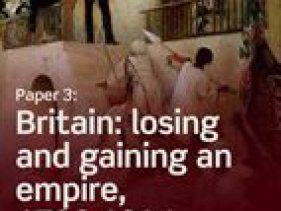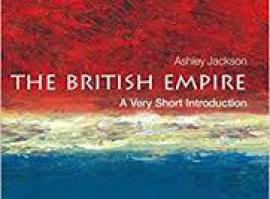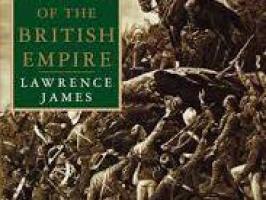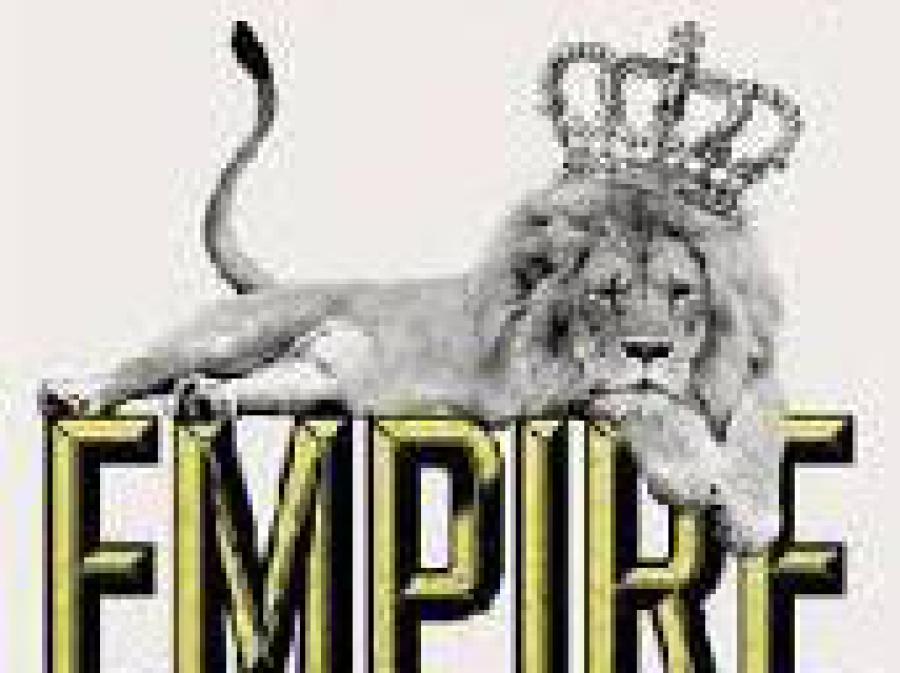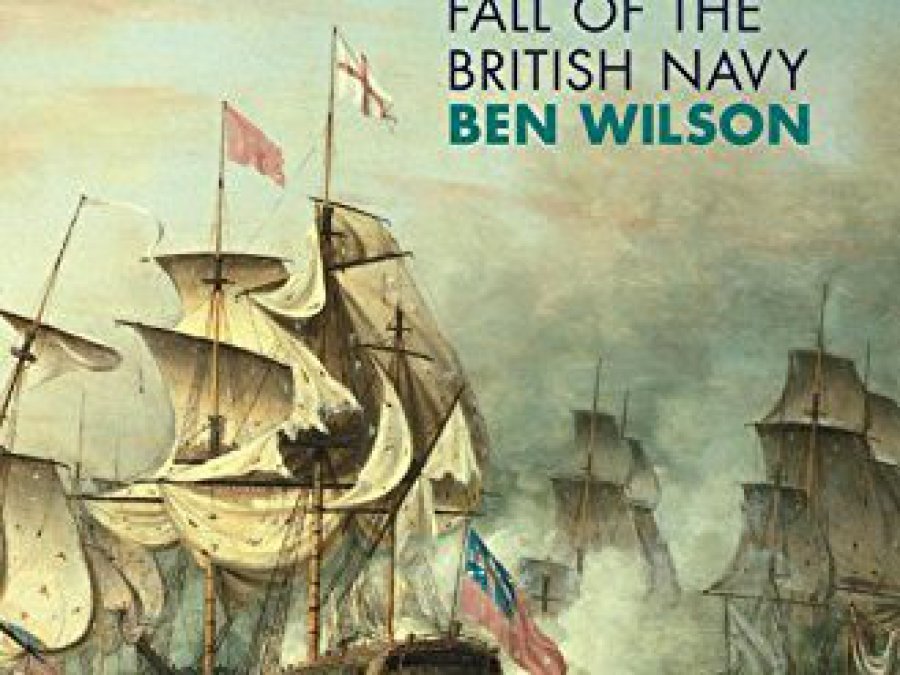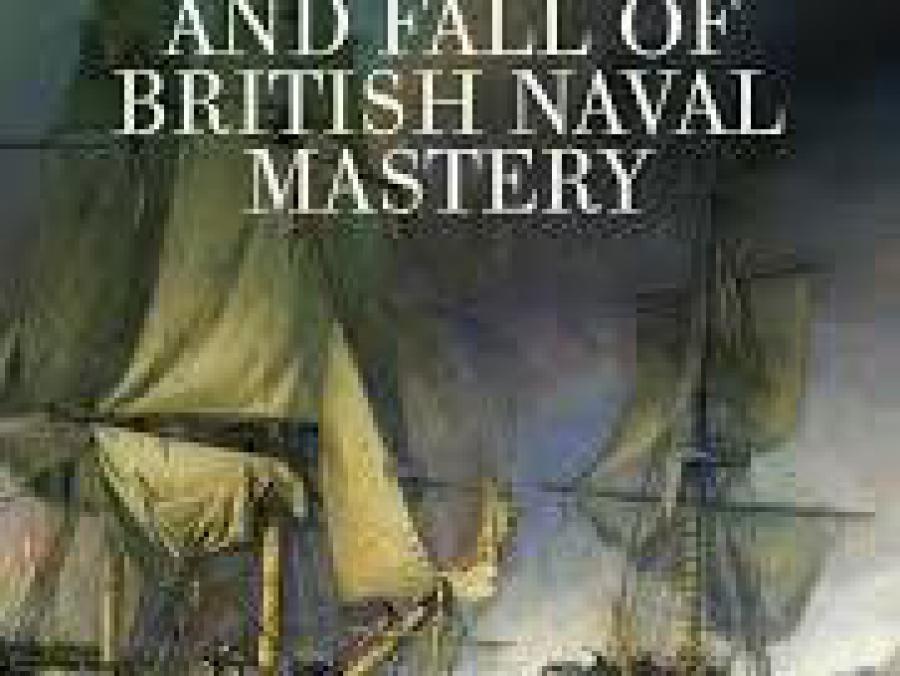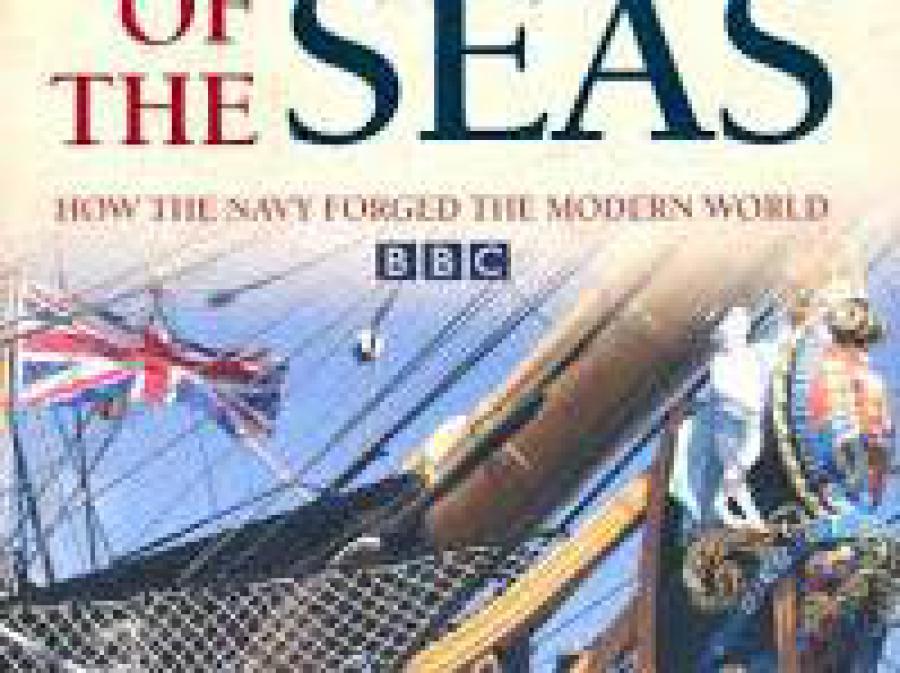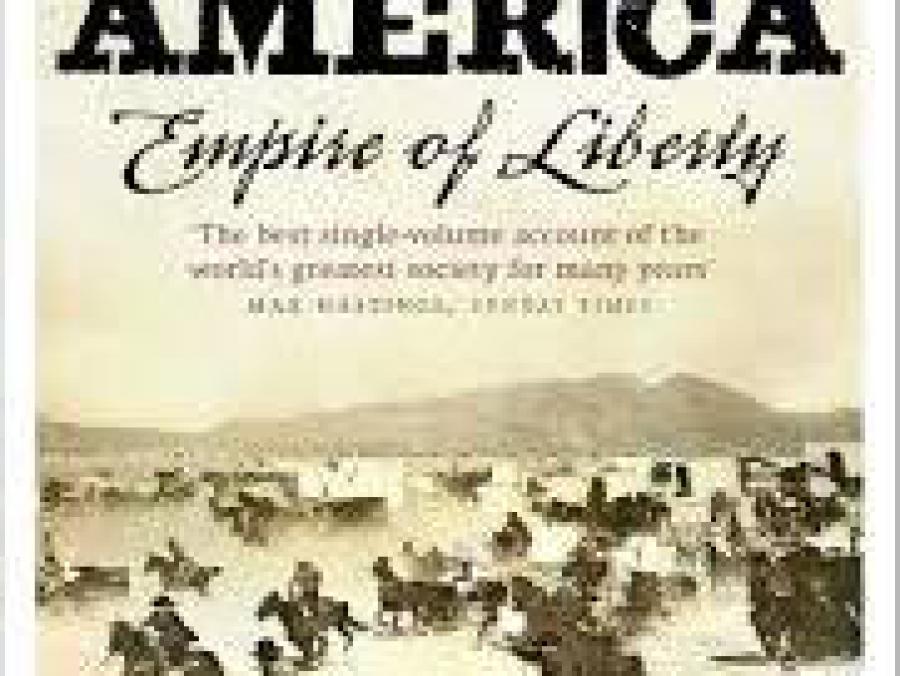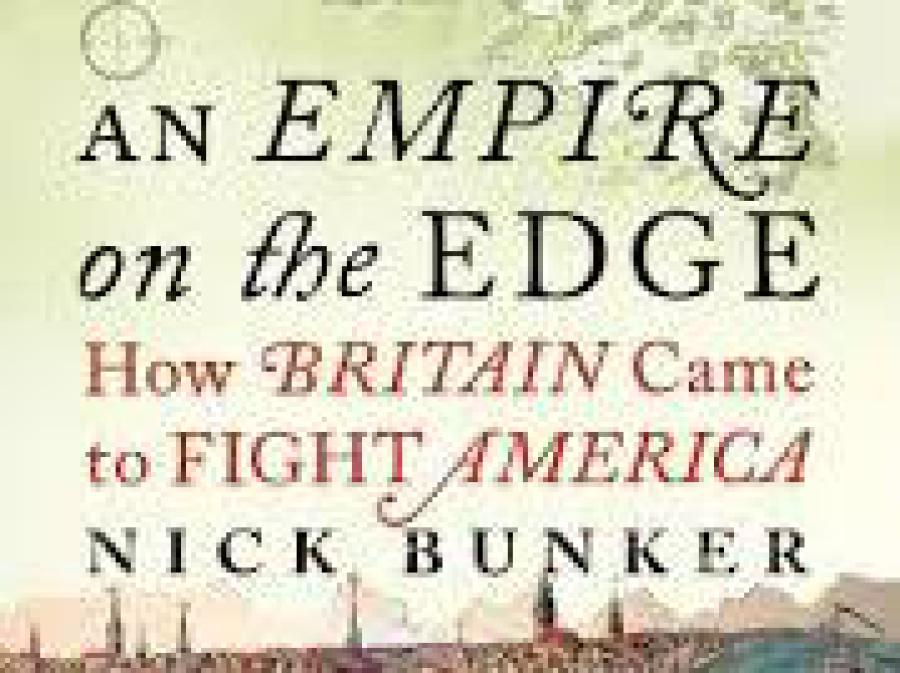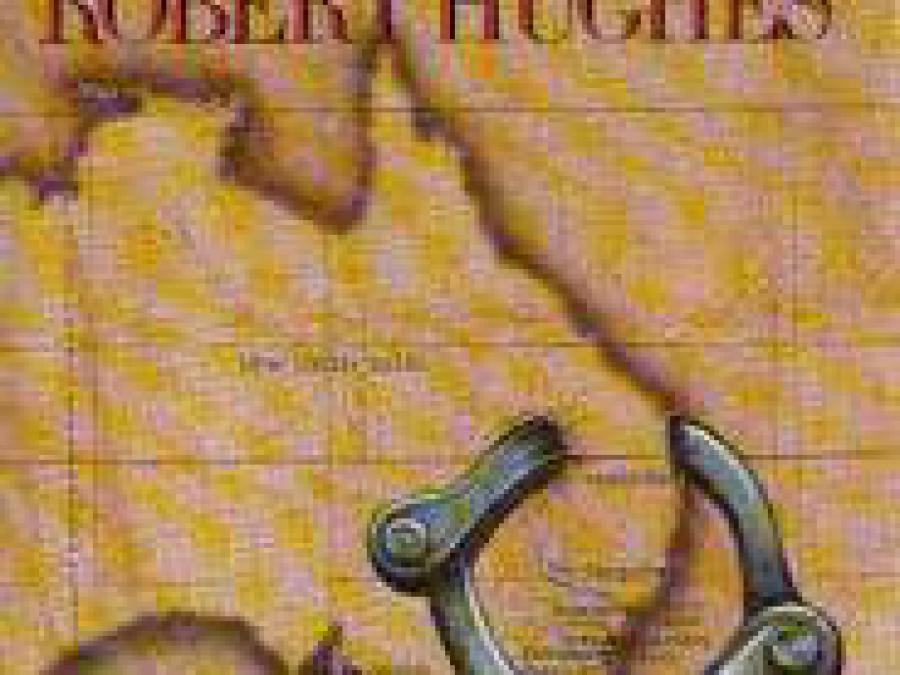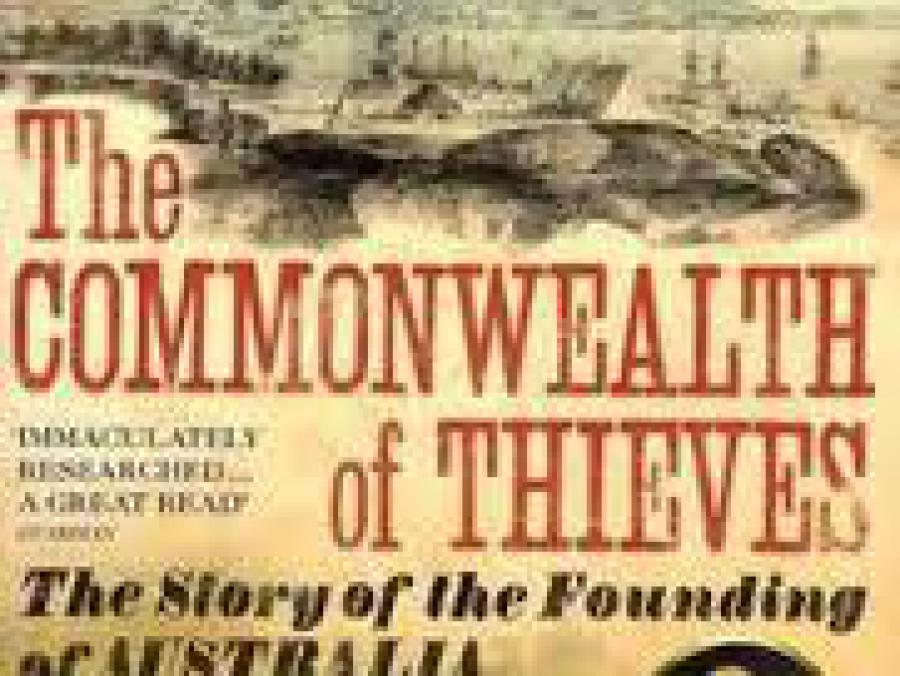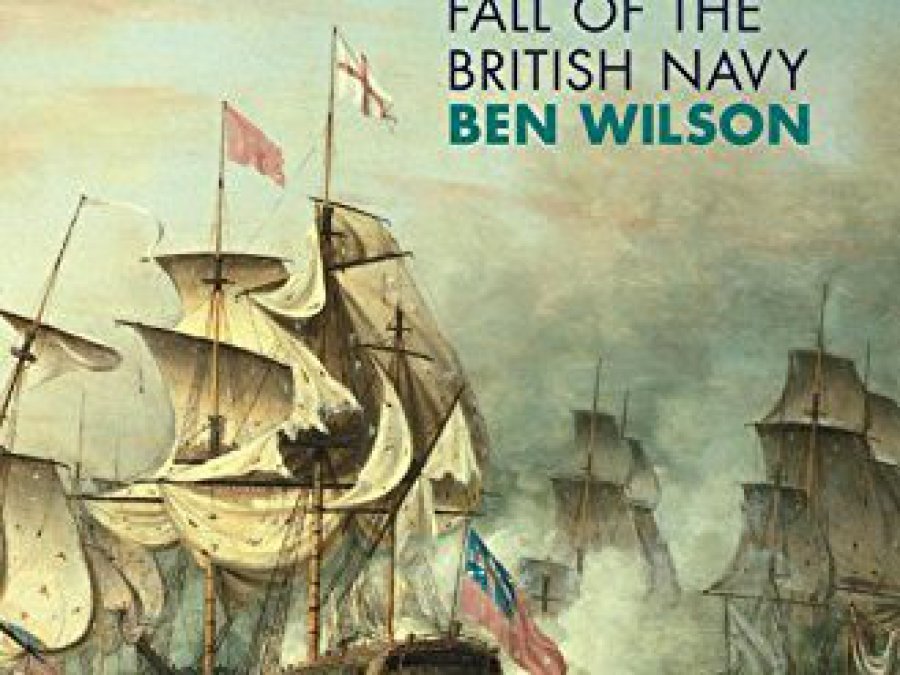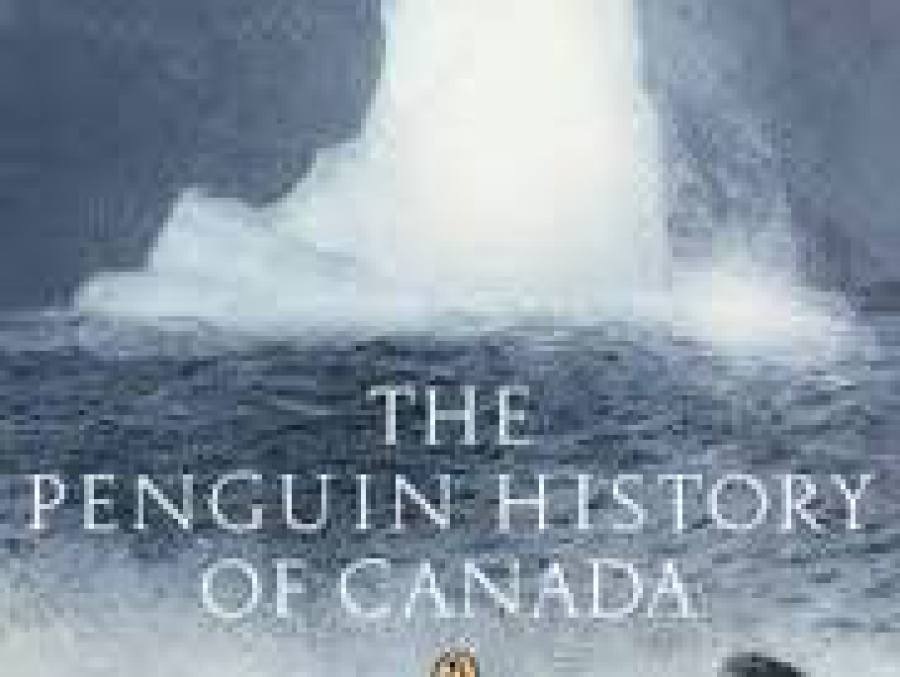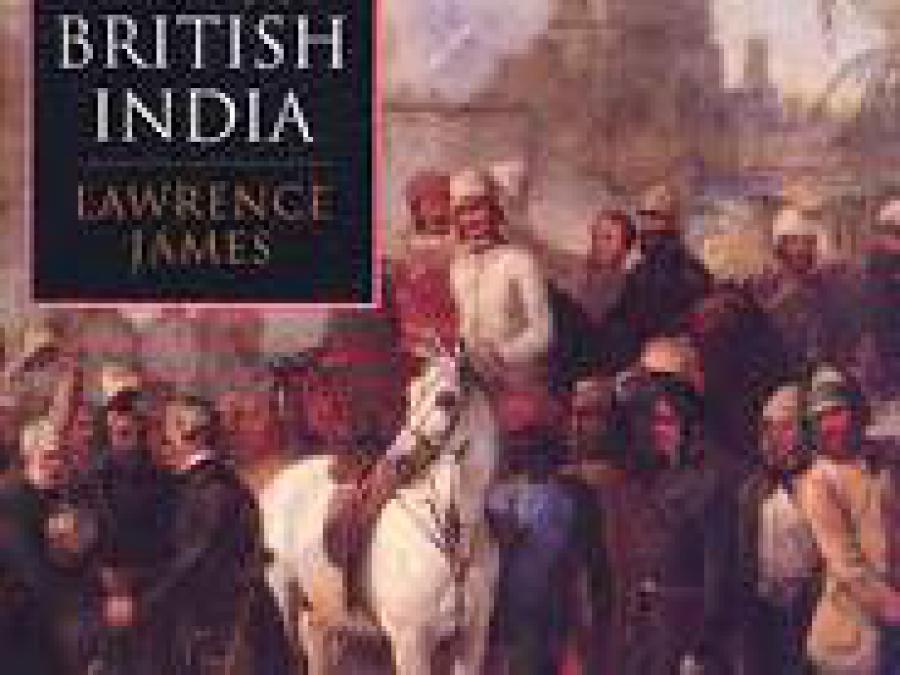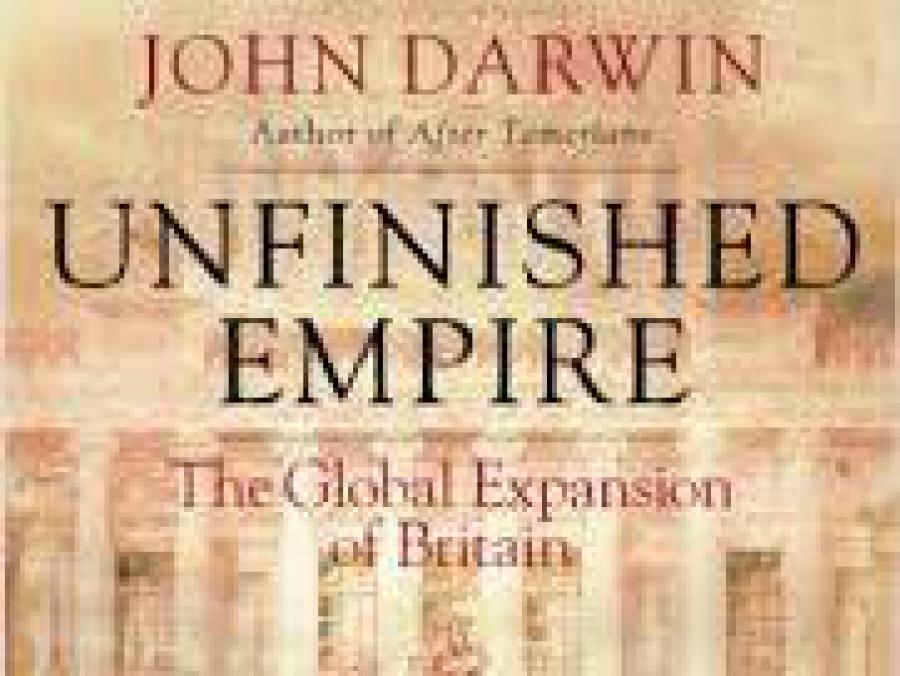This course has been designed around the the Nikki Christie textbook by Hodder. Please click on the image to purchase through Amazon.
A range of resources linked to this page can be found on my TES shop.
The examined part of the A Level will study the British Empire and the part played in this by the Royal Navy and merchant marine. Looking at social, economic and political issues, students will study a series of developments that started with an imperial catastrophe which threatened to reduce Britain once more to a European offshore island, but would then transform Britain's standing in the world so that by the end of the period it had the largest empire the world has known.
Students will be expected to undertake extensive wider reading outside of the classroom. The Edexcel text is the approved core reading material for this course but additional texts may appeal to the preferred learning style of individual students. I have inspection copies of all the recommended books. Extension reading materials are to be found at the bottom of this page.
Additionally this site contains links to video resources which have organised to link to specific booklets. Students wishing to succeed will be expected to use these in their studies.
Comprehensive audio Mp3 files are also available for students covering the core lectures of this course as well as resources available from I Tunes University giving students access to materials from some of the worlds leading academic institutions.
The Exam
30% of final mark
Written examination, lasting 2 hours 15 minutes
Students will answer 3 questions: one from section A, one from section B and one from section C
Sections A comprises one compulsory question for the option studied, assessing source analysis and evaluation skills (AO2)
Section B comprises a choice of essays that assess understanding of the period in depth (AO1)
Section C comprises a choice of essays that assess understanding of the period in breadth (AO1)
Glossary of Terms - Britishempire.co.uk
British Empire Top Trumps
Niall Ferguson - How Britain made the Modern World
Overview Lessons
Overview/Revision Booklet - Free
Lesson - Why the Industrial Revolution Happened Here?
Lesson - Dirty Money
Video -
Students will watch Epsode 4 of 'The British: 2000 Years in the Making' to contextualise the circumstances and position of Britain in the Eighteenth Century
Lesson - Theories of Empire
Students will read Chapter 3 of 'A Very Short Introduction to the British Empire' considering the 'Engines of Expansion' that drove the Empre to evolve and consider the observation that 'The British Empire was acquired in a fit of absence of mind'
Listening
Vesus History Podcast #28 - King George III - George III reigned from 1760 to 1820. The Industrial Revolution really kicked off in Britain during this period, enclosure of land took hold and Britain won the Seven Years War, ensuring that the future of North America would be an English speaking one. In addition, America won its independence from Britain by 1783 and the Declaration of Independence lambasted George for his supposedly tyrannical actions. Why should we learn more about George III?
Lesson- Why Britain? - Niall Fergusons' Empire Pt1
Students will watch Epsode 1 of ' Niall Fergusons 'Empire' to contextualise the circumstances and position of Britain in the Eighteenth Century and the dynamic facors that contributed to the rise of Britain as an imperial power
Lesson - Superpower
Video
Students will watch Epsode 4 of 'The British: 2000 Years in the Making' to contextualise the circumstances and position of Britain in the Eighteenth Century
Lesson -The Seven Years War
Students will be introduced to the Seven Years War that serves as an introuction to the course. They will read Lawrence James 'The Rise and Fall of The British Empire' Chapter 2 'Tis to glory we steer: Gains and Losses - 1743-83'. This will set the scene for both the start of the taught course and a brief outline of Britains declining position in her 13 Colonies.
Reading
Students will be set two additional reading and research tasks to undertake as an extended homework using the supporting worksheets in their booklets. These articles contextualise further the context relating the the Industrial Revolution and the changing nature of trade and business, one of the engines driving the growth of the British Empire:
The Industrial Explosion - students to read the article and complete the supporting worksheet and activities
The Buisness of Empire - students to read the article and complete the supporting worksheet and activities
Each of these sheets will need completing and signing off prior to the start of the course proper
Teaching Resources
Available from my TES Shop
Niall Ferguson: Empire - A Worksheet to support Ep.1 'Why Britain?'
The British - 2000 Years in the Making - Ep 4 - Dirty Money - Worksheet
The British - 2000 Years in the Making - Ep 5 - SuperPower - Worksheet
Knowledge Organiser - D.Willcocks - Trade
Knowledge Organiser - D.Willcocks - Royal Navy
Knowledge Organiser - D.Willcocks - American Colonies
Knowledge Organiser - D.Willcocks - Australia
Knowledge Organiser - D.Willcocks - Canada
Aspects in breadth: ruling the waves
Theme 1: The changing nature and extent of trade
Specification
The main focus of the ‘Aspects in breadth’ is on the changing pattern of Britain's domination of the world's oceans. Within this, the key elements focus on the shifting pattern of trade and its regulation and the power and importance of the Royal Navy in protecting and promoting trade. This will involve an awareness of the development of new markets and classes of imports and exports and the reciprocal influence of changes in trade and the growth of major British ports such as Liverpool, Bristol and London. In analysing the changing patterns of trade and the reasons for change, students should be aware of key features of trade in the period, for example: the importance of the slave trade; the coastal coal trade and increasing export of coal; growing textile exports to India and the Far East and luxury imports from there; the growing import of food and cotton from the Americas in the nineteenth century. Students should also be aware of the significance of industrialisation and technological change for bringing about changes in trade, the influence of government policy in the period and the impact of the specified legislation.
The focus of ‘Aspects in breadth’ is on the process of change over a long period of time, rather than a concentration exclusively on one particular person or innovation. Students should, however, be able to explore key turning points and understand the reasons why key changes took place, why they were important and what their main effects were. These turning points include:
● Captain Cook’s exploration of the South Seas in 1768–71
● The abolition of the slave trade 1807
● The acquisition of Malta, Ceylon and Cape Town in 1815
● The repeal of the Navigation Acts 1849
● The purchase of the Suez Canal shares 1875
Reasons for, and nature of, the changing patterns of trade, 1763-1914: the importance of government policy (key developments: the abolition of the slave trade 1807, the adoption of free trade 1842–46, the repeal of the Navigation Acts 1849).
The changing importance of ports, entrepôts and trade routes within the UK and throughout the Empire, 1763-1914: (key developments: the acquisition of Singapore 1819 and Hong Kong 1842, the opening up of Shanghai to trade 1842, the purchase of the Suez Canal shares 1875, the acquisition of Zanzibar 1890, the lease of Wei hai-wei 1898).
Summary
Trade is arguably the most important 'engine' in the development of the British Empire. Profit has always been the 'end' and trade, the 'means'. Mercantilsim and the Navigation Acts that supported it were the preferred style of commerce until the lessons learnt from the loss of the American colonies resulted in the transition away from Mercantilism towards Free Trade. Underpinned by the theories of Adam Smith, the Americans were initially the first to embrace this new style of unhindered trade yet, to the British authorities it was nothing less than smuggling. Once lost to the British though, the explosion in Atlantic trade between the two countries was testimony to its success and started the move towards Free Trade that the British would finalise with the abolition of the Corn Laws and Navigation Acts towards the middle of the Nineteenth Century. This would be the heyday of Britain's imperial and economic power that would oly be checked by the rising power of resurgent European economies from 1875 onwards.
Timeline
1765- Britain introduces taxes to raise money from the colonies - Enforcing mercantilism and ending sautary neglect. Ending American smuggling/free trade
1775 - American War of Independence begins - Victory leads to a free trade boom between the USA and Britain
1790 - Free Trade given to Ireland - Could free trade provide prosperity and peace to Ireland?
1805 - Victory at Trafalgar - Ensured naval supremacy for a century and opened global free trade markets to Britain
1807 - Slavery Abolished - Reflecting economic motives, morality and strategic imperatives
1815 - Victory at Waterloo - Napoleons defeat opened European markets to British commerce
1819 - Founding of Singapore - The model free trade entrpot
1832 - The Great Reform Act - Refecting middle class demands for enfranchisment and economic aspirations
1833 - Compensation to West Indian Slavers - recompense to the aristocracy who lost out
1842 - Victory in First Opium War - A Free Trade war without morality. Briatin seized the minimum of territory but gained access to the worlds largets market
1846 - Famine in Ireland - Free trade and Laissez-faires limitations
1846 - Repeal of The Corn Laws - Reducing costs by opening up the mercantile corn markets to global trade. A consequence of the GRA and middle class dominace
1849 - Navigation Acts Repealed - The foundations of mercantilism removed, though expolited succesfully by the British
1875 - Britain purchases shares in Suez Canal - The re-emergence of geo-politcs. Britians position challenegd and the tentative moves towarsd more formal empire
1882 - Britain occupies Egypt - To protect Suez and triggering the Srcamble for Africa
1890 - Britain partitions East Africa with Germany - Refelcting the end of 'Splendid Isolation', seeking accomodations and friendly relations with potential rivals
1898 - Britain leases Weihaiwei - To check Russian penetration into China
Trade Lessons
Lesson - Mercantilism v. Free Trade
Activity - Economic Models - Mercantilism to Free Trade & its role in the 'First British Empire'
Students will be introduced to the two economic models relevant to the course and see how new enlightenment scientific thinking was applied to economics by Adam Smith to develop his model of compassionate capitalism based upon the principle of the invisible hand of market forces. This economic theory was embraced by the new middle classes in Britain as well as even earlier by the American settlers in the 13 colonies seeking greater self-government and social mobility and removing the restrictions of the British class system.
Video - School of Life - Adam Smith
Video - A Dramatic - Adam Smith
Video - The Invisible Hand
Extended Reading - Leviathan - David Scott - The British Atlantic - pages 370 - 376
Worksheet
Lesson - The Industrial Explosion - Reading based activity with students completing the worksheet in their booklets
Lesson - Mercantilism Simulation
Extended Reading - The Business of Empire - Reading based activity with students completing the worksheet in their booklets
Lesson - Amazing Grace - In 1797, William Wilberforce, the great crusader for the British abolition of slavery, is taking a holiday for his health even while he is sicker at heart for his frustrated cause. However, meeting the charming Barbara Spooner, Wilberforce finds a soulmate to share the story of his struggle. With few allies such as his mentor, John Newton, a slave ship captain turned repentant priest who penned the great hymn, "Amazing Grace," Prime William Pitt, and Olaudah Equiano, the erudite former slave turned author, Wilberforce fruitlessly fights both public indifference and moneyed opposition determined to keep their exploitation safe. Nevertheless, Wilberforce finds the inspiration in newfound love to rejuvenate the fight with new ideas that would lead to a great victory for social justice.
Worksheet - Students will study three contrasting arguments leading to the abolition of slavery in 1807. The strengths and weaknesses of each argument need to be recorded and identified in order for students to complete a ranking/hierachy activity of their choice, identifying the principle casue for abolition.
Extended Reading - A Gruelling Campaign
Extended Reading - Breaking the Bonds
Extended Reading - The Revolt against Slavery
Why did Britain abandon slavery and embrace abolitionism? Group Work - Students are to explore the variety of scenarios explaining Britain's dramatic shift in policy. Was it a religious epiphany or, was it something strategic or economic?
Test - Students will be assessed on their understanding of the key information in the abolition of slavery
Lesson - Imperial Beginnings in India - Lecture from the 'Great Courses' - How did Britain re-orientate her Empire away from her declining fortunes in North America towards India, accepting in due course her failure to establish herself in the prize Spice Islands of the East Indies. How did Britain establish a mercantile empire through non-governmental private enterprise and win an empire on the cheap.
Lesson - Clive in India - Lecture from the 'Great Courses' - How did Clive lead Britain to hegemony in the sub-continent through exploiting the declining power of the Mughals and the defeating the French and her allies in the Indian theatre of the Seven Years War. How did the EIC evolve from a trading company to a territorial one, exploiting Bengal, enriching the Nabobs and behaving in a way that brought a moral mission to Britain;s imperial endeavours.
'The British were never entirely easy with the idea of territorial empire. The British were taught to be proud of their laws, individual freedoms, and elected government. But, many asked, were rights of the British exclusive, or could they be exported and shared by everyone under Britain s rule? This question dogged the empire throughout its history and, given that at crucial moments the answer was ‘yes’ proved to be its eventual undoing.’
Lawrence James - The Rise and Fall of the British Empire
Lesson - The East India Company and the reorientation of the British Empire - Students will watch the Dan Snow documentary on the growth and establishment of the EIC in India and its expansion as a 'Private Enterprise Empire'. The documentary shows the role of mercantile monopolies at the start of the British Empire and how trade and profit were the principle engines of growth. The significance of India is explored and how it become the centre of Britain's Second Empire after the loss of the 13 Colonies. It was at first mesmerising to the British and then Anglicised by the British, reflecting the way in which the power of Empire transformed not just the conquered, but also the conquerors.
Worksheet - Dan Snow - Birth of an Empire - Pt1
Worksheet - Dan Snow - Birth of an Empire - Pt2
Video - Dan Snow - Birth of an Empire - Pt2
Extended Reading - Leviathan - David Scott - Eastern Promise - pages 358-70
Students will watch the Dan Snow documentary on the rise of the East India Company and its transition from a British Crown monopoly to a Corporate Empire. Students will learn about the dynamic relationship between the two countries as the British evolve from being seduced by India to controlling and changing it with all the consequences that entailled.
'There was a time when maps of the world were re-drawn in the name of plants, went two empires, Britain and China, went to war over flowers: the poppy and the camellia.'
For all the tea in China - Sarah Rose
Lesson - The McCartney Mission - How the McCartney Mission to China illustrates the role of business and profit within the British Empire but also the changing nature of trade from mercantile to free trade. This is best illustrated from the initial homage paid to the Chinese Emperors to the submission of China after the Opium Wars and the opening of the country to the full force of British free trade
Video - The First Opium War
Video - The Second Opium War
Video - The Third Opium War
Extended Reading - Michael Lynch - The McCartney Mission
Worksheet
Extended Reading - Robert Hughes - The Opium War
Worksheet
Extended Reading - Robert Hughes - Traders in Oblivion
Worksheet
Extended Lecture: The Great Courses - The Rise and Fall of The British Empire - 13 - China and the Opium Wars
Lesson - The significance of the evolution of Britains network of ports, entrepots and trade routes - Independent Project and Presentation Work
Britain evolution from Mercantilism to Free Trade was not a sudden one, but a process over time reflecting both her changing circumstances:
- in losing the American Colonies
- Experiencing an industrial revolution
- Reflecting upon the ideas of Adam Smith
- The growth of a middle class
- War with France
The ‘ends’ were always profit , but the ‘means’ was always pragmatic. When mercantilism failed to deliver the ‘ends’ pragmatism directed Britain to exploit her circumstances and embrace free trade. This would remain the case until the rest of the world became effective at competing with us.
Students will study the following Trade acquisitions:
How does each location reflect the changing role, economic and military position of Britain
Singapore - Acquired by Raffles, working independently of the British government. Established as an entrepot, it would provide an outstanding economic model and further highlight the advantages of Free Trade. Sitting astride the Straits of Malacca, the British colony would dominate the stretch of water, illustrate Britains regional dominance, and provide a port on the route to China, channelling the goods from the British Indian Empire.
Singapore would gain even greater influence following Britain's triumph in the Opium War and demonstrate the preference of Britain for the minimum of formal empire as reflected in the next conquest.
Hong Kong - Despite absolute victory over China in the Opium War, the taking of Hong Kong reflected Britain's complete focus on maximising trade and profit over formal conquest. Situated on the mouth of The Pear River, Hong Kong would provide Britain with a commercial and military base with which to protect the lucrative trade with China and police her Free Trade ambitions for China.
As the power with the most to gain from an 'Open Door' policy to China, Britain utilised the existing Chinese government and civil service to maintain the peace in China whilst economically expoliting her newly opened markets. The triumph over China arguably marked a high-water mark in the relative power of Britain.
Shanghai - was one of the Treaty Ports opened by China after the Opium War of 1842. It was the ultimate expression of Free Trade with the British leaving the running of this port to the merchants who made their business there. Commanding the Huangpu River, the British used this and other rivers to open trade to the interior of the country. All were welcome in Shanghai
The Suez Canal - Neither interested in its construction or ownership, the British contented themselves with having free access to its facilities and exploiting the now fastest route to India. When however, debts incurred from its construction led to instability within Egypt, the British and French took an increasingly controlling role in the country. The British even went as far as to purchase a controlling stake in The Canal in 1875. A consequence of this was a rise in nationalism which led to a hostile Egyptian government gaining control. This was unacceptable to Britain for whom the canal was arguably one of the most strategic arteries of the British Empire and trade route.
With the French unwilling and unable to intervene due to German pressure (following their defeat in Franco-Prussian War), Britain intervened unilaterally in 1882, Britain would rule Egypt through a 'Veiled Protectorate' and effectively rule the country for over seventy years.
Britain's need to protect The Canal and subsequently, the source of The River Nile, would lead to Britain being drawn into imperial campaigns in Sudan. This in turn would trigger a new phase of imperial expansion and the period known as 'The Scramble for Africa'.
Zanzibar - Sat off the east coast of Africa, Zanzibar was taken by the British for a variety of factors. The seizing of Egypt had triggered the "Scramble for Africa' and whilst Britain did indeed take the lions share, she was now operating in a world where her supremacy was challenged. Geopolitics, which dominated the world until 1815, now re-emerged as Brita
in had to come to terms with rising powers and balnce their influence along with her glorious isoaltion.
Zanzibar was acquired through an exhange with Germany, which in turn was hoped to ease tensions and build friendship between the two countries. Contemperary to these events, Anglo-French relations hit a nadir over the confrontation at Fashoda. Britain needed to consolidate her possessions whilst ensuring she maintained her global pre-eminence. Zanzibar, would possibly protect the flank of Britain's (in particular Cecil Rhodes) ambition to dominate the African continent, from Cape to Cairo.
Morally, Zanzibar also demonstrates an ethical dimension to British imperial policy. Slavery, which Britain had gone to such lengths to abolish in West Africa, was found to be flourishing in East Africa and was promptly suppressed. The power of the 'Religious Lobby' has been prevalant in Britain since the turn of the Nineteenth Century with abolition, missionary work in India and finally, in the drive to acquire Sudan.
Wei-Hai-Wei - Was latterly acquired to police the expansion of Russian influence in China. Checked in the west in by The Crimean War, blocked from expanding south by the British Raj, Tsarist Russia pushed eastwards to Siberia and The Pacific. Allied with Britain's oldest enemy, France, Russia needed to be warned from interfering or exploiting China.
Britain's base in China was leased at a time of increasing challenge and rivalry for Britain. Geopolitics were causing the development of tensions that would ultimately come to a conclusion in WWI. French and German naval programmes required Britain to commit to match their strength through the Two Power Standard and concentrate more strength in the European waters she had supremely dominated since 1805. Stretched far too uncomfortably, Britain sought a naval alliance with Japan in 1902 to mitigate the impact of her "imperial Overstretch'.
Students will produce:
- a completed Mind Map to demonstrate and share your understanding - Video Exemplar
- Complete the ‘Theories of Empire’ Ranking
- Write an essay introduction: ‘How far do you agree that the acquisition of _____ provided the most significant stimulus to British trade in the year 1763 to 1914?’
All resources will be submitted prior to presenting your work and copies will be made and distributed
Lesson - Assessment
Viewing
Empire - BBC - Jeremy Paxman
Empire - How Britain Made the Modern World - Niall Ferguson
Suez - Dramatised reconstruction of Disraelis purchase of the canal with the assistance of the Rothschilds
Teaching Resources
Avaliable from my TES Shop
Introductory Overview / Revision Booklet - Changing nature & extent of Trade
The Birth of Empire - The East India Company Episode 2 - Worksheet to support the BBC documentary
'The Birth of Empire' Documentary
Theme 2: The changing nature of the Royal Navy
Specification
The changing Royal Navy, 1763-1914: the significance of changing ship types; the growing role of commerce protection, including protecting, and later suppressing, the slave trade; suppressing piracy and defending British commerce (key development: the attack on Algiers 1816); the work of exploration and mapping (key development: Captain Cook's exploration of the South Seas, 1768-71).
The importance of the acquisition and retention of key strategic bases around the globe, 1763-1914 (key developments: Gibraltar retained 1783, and the acquisition of Malta, Ceylon and Cape Town in 1815, the Falklands in 1833, Aden in 1839 and Cyprus in 1878).
Summary
Funded by the taxes and revenue secured through Trade, The Royal Navy evolved to fulfil two consistent roles: The Defence of the Realm and the protection of trade and the sea lanes that allowed Britain to trade so effectively. In wartime this was its foci. In peacetime however, the Navy could expand its role to include anti-piracy operations, the suppression of slavery and exploration.
As a machine for fighting wars it can be argued that the Royal Navy was one of the principle causes for the evolution of the centralised state and its institutions that gave Britain such an advantage in its wars with bigger rivals like France and Spain. It certainly contributed in a large part to the fostering of the Industrial Revolution as war necessitated the innovation of technologies that helped the Royal Navy assert itself and move from a position of superiority, achieved after 1763, through to supremacy achieved after 1805. Its rise however, was not linear and due to its associated ruinous costs the Royal Navy often found itself reduced in strength during times of peace as well as deeply conservative in times of calm after 1805 and during its unchallenged role as the worlds policeman during the Pax Britannica.
Despite former rivals reasserting themselves latterly in the second half of the Nineteenth Century, the Royal Navy managed to remain innovative enough and reform minded when required to ensure it started the First World War retaining its position as the greatest naval force in the world.
Navy Lessons
Lesson - Hearts of Oak
Video
The first of Dan Snow's documentaries on the rise of the Royal Navy and the institutions of the State and economic and technical innovations that facilitated this.
Lesson - An Introduction Empire of The Deep
Extended Reading - Empire of The Deep - Ben Wilson - Chapter 42 - Persuasion - 1805 - 1842
Students will be introduced to how much the Royal Navy has affected language and culture?
Lesson - The Development of the Royal Navy - As war became globally more expansive, financially more expensive and participants sought innovative advantage, how did ship design and tactics evolve? As bigger became better, how would naval architects ensure stability at sea, whilst attempting to out build and out gun their enemies.
With naval battles being difficult enough to fight with the challenge of finding the enemey fleet, yet alone organise once battle began, the challenge was on to evolve naval tactics to achieve a decisive advantage over the enemy.
In this lesson, students will student how ship design evolved to acomodate the innovations of the industrial Revolution to improve both size, speed and firepower and how the tactics that won Trafalgar were derived from the application of science to warfare
Lesson - Wooden Walls
Lesson - The Battle of Trafalgar - A re-enactment - Through role-play can we illustrate our understanding of the technological and tactical innovations of the period
Extended Reading - Empire of The Deep - Ben Wilson - Chapter 43 - Making the Weather - 1842-60
Lesson - The Royal Navy and Britain's commercial interests
Lesson - The Golden Ocean
Video
Extended Reading - Britannia Rules the Waves
Extended Reading - Empire of The Deep - Ben Wilson - Chapter 44 - Arms Race - 1860- 1899
Lesson - Commercial Interests - How did Britain's move from Mercantilism to Free Trade affect the Royal of the Royal Navy? With the Navy dependent upon the tax revenue of the Merchant Navy how did the Industrial Revolution impact upon the growth of the Royal Navy set against the background of both war and then the Pax Britannica.
Lesson - The importance of Key Strategic Acquisitions - Where did Britain acquire additional bases in order to reward herself for victory in war and to police the commercial acquisitions studied earlier? Students will see how the distinction between trade and strategic acquisitions can also become blurred when examples like Singapore and Suez clearly demonstrate features of both and how Britain's acquisitions evolved determined by the commecial and strategic needs of the time. therefore, an understanding of the chronology of the move from Mercantilism to Free Trade is essential in order to grasp the evolving strategic necessities of Britains' imperial policy.
Worksheet
Activity - Case Studies
Video
Students need to consider when, why and how the role of each of the locations changed across the duration of the course studied. Accquisitions need to be considered against the role and nature of trade and the global position and strength of the Royal Navy.
Gibraltar - acquired before the required timeline of the syllabus, when the Mediterranean was already a critical location for the flow of goods and trade between the West and East. With France and Spain serving as Britain's principal foes, the capture of 'The Rock' would ensure the ability to police and interdict trade into the Mediterranean as well as preventing the ability of the French from combining the strength of their Mediterranean and Channel fleets to win supremacy in the English Channel.
Gibraltar was originally captured from Spain in 1704, but the humiliation of the Seven Years War led to Spain and France seeking an opportunity to seize back this location at the first chance. The American War of Independence would provide this chance with Britain distracted across the Atlantic and unprepared for a war in more than one theatre. Her weakness is best exemplified by the early loss of Minorca, whilst her determination to succeed is equally illustrated by the punishment metted out to Admiral Byng and the consequential development and encouragement of 'hyper-aggresive' tactics that would soon be witnessed at the Battle of The Saintes and latterly at The Nile and Trafalgar.
Aden, at the bottom of the Red Sea was acquired to control the exit/entrance into the Indian Ocean prior to the construction of the Suez Canal. The location of Aden allowed Britain to dominate the final leg of the quickest route from London to India. From humble beginnings, Aden would elavate its importance with the opening of the Suez Canal in 1869 and even more once Britain took control of The Canal in 1875. Trade through Suez was dominated by British ships and offered coaling faciltiies and latterly a key location in the imperial telegraph network. After the Indian Mutiny, Aden would gain an even greater significance as a key location in allowing Britain to control all the key strategic locations en route to the Sub-Continent.
The Cape of Good Hope - captured by Britain during the Napoleonic Wars from his Dutch allies, it was ceded to Britain in 1815. From that date until the construction of the Suez Canal, the Cape dominated the key strategic location on the quickest sea route to India. Its significance would be partially affected by the opening of Suez, but with The Canal being dependent in the large part on the use of steam-powered ship, the Cape would remain strategically important especially in time of war when the entrances to the Indian Ocean would be dominated by Britain.
Cyprus was ceded by The Ottoman Empire in 1878 to serve several roles to Britain. Falling after 1875, the British were keen, with their relative global position now challenged, to sure up their existing position. Cyprus would allow the British to consolidate their position in the Eastern Mediterranean, covering both their naval base in Alexandria and adding further protection to Egypt and Suez. Additionally, Cyprus would protect The Straits from the threat of Russian expansion south. This had been temporarily checked with the Franco-British victory in The Crimean War, but Russian expansionism eastwards was inexorable, threatening India, as part of 'The Great Game' and towards the Pacific and China eastwards. This in turn would be checked by the British in their earlier acquisition of Wei-Hei-Wei.
Malta, like Ceylon and the Cape, was won by Britain during the Napoleonic Wars. It became permanently British in 1815. With its natural harbour, location exactly in the middle of the Mediterranean and astride the route between North Africa and Italy, it gave Britain a naval base, coaling station and another stepping stone on the route to India. With the control of The Suez Canal, the tiny island gained even greater importance as the home of the Royal Navy's most prestigous command, The Mediterranean Fleet
Ceylon.
The Falklands were acquired by the British to ensure control of the route to The Pacific via Cape Horn, as well as allowing a base for Britain to exploit her informal and highly lucrative empire in South America, thriving during Britain's domination of world trade. Britain's formal presence in South America was limited to these islands and British Guyana in the north of the continent. Her economic empire however, was immense.
Additionally, the islands were taken simply because the British could, and exploited the declining position of France and Spain. Despite Britain's reluctance to take formal and frequently, expensive control of territory, the strategic position of The Islands superseded their normal caution. Immigration from Britain was encouraged and whaling and sheep farming would be established to make the colony ecoonomically viable. The Islands would provide a strategic base and coaling station for the Royal Navy in The South Atlantic prove its use in the early stages of WWI.
The construction of the Panama Canal in 1914 however, would reduce the strategic value of The Falklands. Cape Horn would no longer be the quickest route from the Atlantic to The Pacific and The Falklands would lose their significance to Britain until 1982.
Lesson - High Tide
Video
Worksheet
Extended Reading - Empire of The Deep - Ben Wilson - Chapter 45 - The Brink -1899-1914
Lesson - Captain Cook and The Age of Exploration - Students will see how in a period of peace the Royal Navy would widen its brief to take on the responsibility of mapping the planet in the name of science, strategy, economics and justifying its own existence. Enlightenment ideas had already been applied to economics by Adam Smith and so they could also be to the imperial ambitions of Great Britain.
Cooks career had started by mapping the St Lawrence River in Canada to allow the capture of Louisburg and consequently Quebec in the Seven Years War. With North America now British and the Seven Years War at an end, Cook and the much reduced Royal Navy was tasked with the job of assisting the Royal Society in its measurements associated with the transit of Venus. But here is where science and strategy would overlap. After visiting Tahiti, the site of the astronomical measurements, Cook was to explore the world, taking advantage of a new found knowledge of Longitude, to find new discoveries and the mythical Great Southern Continent. It was to be claimed for Britain, forging new markets, and opening up new trade routes.
This would be the first of his three great voyages of discovery. Eaach would serve Britain in more than one way
Documentary - BBC Timewatch - The Man behind the Legend
Video
Worksheet
Extended Reading - The World Revealed
Extended Viewing - Captain Cook - Obsession & Discovery: A Likely Lad
Extended Viewing - Captain Cook - Obssesion & Discovery: Taking Command
Extended Viewing - Captain Cook - Obsession & Dicovery: Beyond Speculation
Extended Viewing - Captain Cook - Obsession & Discovery: The Northwest Passage
Lesson - Sea Change
Worksheet
Extended Reading - Scuppering Britains Fossil Navy
Worksheet
Extended Reading - Meeting the German Menace
Worksheet
Extended Reading - Empire of The Deep - Ben Wilson - Chapter 45 - The Brink - 1899-1914
Lesson - Assessment
Available from my TES Shop
Empire of the Seas - Worksheets to support all four episodes of the BBC Documentary
Trafalgar - The Order of Battle
'Empire of the Deep' Ben Wilson - Supporting Worksheet - Chapter 42 - Persuasion
'Empire of the Deep' Ben Wilson - Supporting Worksheet - Chapter 43 - Making the Weather
'Empire of the Deep' Ben Wilson - Supporting Worksheet - Chapter 44 - Arms Race
'Empire of the Deep' Ben Wilson - Supporting Worksheet - Chapter 45 - The Brink
'The Rise and Fall of British Naval Mastery' Paul Kennedy - Chapter 4 - Triumph and Check: 1756-1793
'The Rise and Fall of British Naval Master' Paul Kennedy - Chapter 6 - Pax Britanica: 1815-1859
'The Rise and Fall of British Naval Master' Paul Kennedy - Chapter 7 - Mahan versus Mackinder
Aspects in depth: losing, gaining and governing territory
The ‘Aspects in depth’ are five key episodes in the unfolding story of the British empire in these years. These are geographically diverse, illustrating the spread of British power.
Although the topics are clarified separately below, students should appreciate the linkages between them since questions, including document questions, may be set which target the content of more than one topic, for example the contrast in the behaviour of the British government of the 1770s towards North America compared with the government of 1837–39.
Students will be required to interpret and evaluate a documentary extract in its historical context, but the knowledge they will need to have will be central to that specified in the topics. Questions will not require them to demonstrate knowledge of references in documents to events or individuals other than those explicitly specified.
The loss of the American colonies, 1770–83
Specification
The focus of the topic is on the loss of what has been called the ‘first British empire’, namely the thirteen North American colonies. The study begins in 1770 and students should appreciate the continuing objection in North America to tea duties. They should understand why the issue of taxation was so sensitive and the reasons for the often-difficult relations between the crown's agents and the populace and their local assemblies. Students should understand how the events of 1774 to 1776 led a substantial number of colonists to embrace independence, but they should also appreciate the existence of a considerable number of loyalists. Students do not need to have a detailed knowledge of the war: they need to be aware of the military failings of Burgoyne and Cornwallis and the significance of the French and Spanish intevention. They should understand the reasons for Britain’s defeat, including how the military resources available were unequal to dealing with a war dispersed across such wide area. They also need to understand why defeat was accepted in Britain.
Tensions between colonists and the British, 1770–75: the issue of custom collection and tea duties, including the Boston Tea Party; the Coercive Acts 1774 and their impact.
Clashes between British forces and rebels, 1775–76; the Declaration of Independence and Articles of Confederation.
Britain's defeat, 1778–83: French and Spanish involvement; Britain’s limited military resources; the defeats of Burgoyne 1778, and Cornwallis 1781; the decision to seek peace and accept the Treaty of Paris. Impact of defeat on Britain 1783.
Summary
Trade and a private enterprise approach to empire building left Britain with an enviable but, unintended Atlantic Empire by the end of the Eighteenth Century. Attracting the dispossessed, the
rugged and the religious, America evolved and matured as an ignored extension of British society on another continent. More self- reliant and suspicious of governmental interference, the colonies
resented London's attempts to redefine the metropolitan-colonial relationship after the Seven Years War and increasingly expressed their own views of what it meant to be British and the inalienable
rights that conferred upon them.
This argument would simmer and burn for years: how can you square an Englishmen's fundamental liberties with loyalty to a distant imperial government? Are they in fact mutually incompatible?
Amplified by distance and slow communication it would also illustrate not just Americas increasing confidence and maturity but also Britain's imperial immaturity in addressing the issues of an until
now, unsought Empire and the responsibilities it had towards its brothers (or, increasingly, cousins?) on the other side of the Atlantic.
America Lessons
Lesson - An Introduction to the causes of the American War of Independence. Students are to study the evidence and contextualise the events in North America against the context of the Trade and Maritime themes they have previously studied.
Did the hard earned, inalienable rights of the British only reside exclusively with those in Britain?
'The British were never entirely easy with the idea of territorial empire. The British were taught to be proud of their laws, individual freedoms, and elected government. But, many asked, were rights of the British exclusive, or could they be exported and shared by everyone under Britain s rule? This question dogged the empire throughout its history and, given that at crucial moments the answer was ‘yes’ proved to be its eventual undoing.’
Lawrence James - The Rise and Fall of the British Empire
'The Empire carried within it from birth an ideological bacillus that would
prove fatal. This was Edmund Burke’s paternalistic doctrine that colonial
government was a trust. It was to be so exercised for the benefit of subject
people that they would eventually attain their birth right - freedom.'
Niall Ferguson - Empire
Extended Lecture: The Great Courses - The Rise and Fall of The British Empire - 7 The Loss of the American Colonies
Lesson - Being a British colonist - How was a British colonial similar to his British brother? Students will watch a Yale University Lecture with Prof. J.Freeman where she will investigate themes of loyalty, colonial inferiority complexes, British superiority complexes and question how and why a divergence took place so suddenly between the metropole and its western frontier so quickly after the end of The Seven Years War. Students will work through the structured support sheets.
Extended Lecture: The Great Courses - The History of the United States, 2nd Edition - 9 The Great War for Empire
No Europeans felt the pull of the New World more strongly than the British and Irish. Roughly 350.000 people from England and Wales, along with 30,000 Irish and 7.000 Scots, traversed the Atlantic in the seventeenth century. The great majority of these migrants went either to Jamaica and Britain’s other sugar plantations in the Caribbean or to the Chesapeake: the tobacco-growing colonies of Virginia and Maryland.
The pattern changed in the eighteenth century as transatlantic emigration became less of an English and more of a British and European phenomenon. Of the 300,000 or so who left the British Isles for the Americas in the period 1700-80, over a third were from Ireland – mostly Presbyterian ’Scots-Irish’ from Ulster-and about 75.000 from Scotland. Joining this exodus were 100,000 people from Germany and central Europe, with the traumatised Mittelberger in their midst.
Leviathan - The Rise of Britain as a Great Power
Lesson - Being a British American - How was a British colonial different to his British brother? How did the early history of the 13 Colonies reflect Britain's laissez-faire, mercantilist, empire on the cheap, private enterprise approach to Empire. Did the American gene pool produce a different character from that of the motherland and did Britain change more significantly than America? Students will watch a Yale University Lecture with Prof. J. Freeman. Students will work through the structured support sheets.
Lesson - Increasing tensions in the Colonies - Students will consolidates their understanding gained from the two Yale lectures by working through the events that turned the shared victory and unity of 1763 into a descending spiral of mistrust and antagonism: The Stamp Act, Samuel Adams, the Townshend Duties, Declaratory Act and Boston Massacre
Samuel Adams - Biography
Video - Taxes and Smuggling - A Prelude to Revolution - Crash Course
‘American’s merely cited an ancient principle of English law, dating back to Edward I in the thirteenth century. By virtue of a statute enacted in 1297, taxes required the consent of those who had to pay them; and consent took the form of a vote by their representatives in Parliament’
Empire of the Edge - Nick Bunker
Lesson - Outraged Colonials - The Stamp Act - What was the significance of this Act of Parliament and why did it become the single most popular cause of discontent?
Extended Lecture: The Great Courses - The History of the United States, 2nd Edition - 10 The Rejection of Empire
Lesson - Resistance or Rebellion: What is going on in Boston? Why did Boston become the focal point for the unrest and how did the handling of the problem contribute to the deterioration in relations
Lesson - The Causes of the Revolution
Podcast - Versus History - #26 - Causes of the American Revolution 1775-1783 - The Thirteen Colonies of British North America declared their independence from Great Britain in 1776, by signing the Declaration of Independence drafted by Thomas Jefferson. The first shots of the war had already been fired at Lexington and Concord in 1775; war continued until 1783 and the Treaty of Paris, where Britain acknowledged that America was no longer part of the British Empire. What caused this rupture between Britain and America? In this episode, Patrick (@historychappy) discusses the role played by the settlers themselves and enlightenment thinking in the 18th century, while Elliott (@thelibrarian6) discusses the role played by British legislation, the Patriots and the end of 'Salutary Neglect' in 1763. Contributor Conal (@prohistoricman) suggests that tea and taxation also had a significant part to play. After all, everyone has heard of the Boston Tea Party! For terms of use, please visit www.versushistory.com
Lesson - The logic of resistance -
Extended Lecture: The Great Courses - The History of the United States, 2nd Edition -11 the American Revolution
Independence - Video Lecture
Lesson - The Course of The War
Video - Why did America win the War of Independence?
Video - America Revolution: Why did Britain lose by 1783
Key Chronology
Viewing
The War that made America - Part 1 - PBS
The War that made America - Part 2 - PBS
Listening
Versus History Podcast #53 - How did Britain lose the 13 Colonies
Versus History Podcast #26 - Causes of the Revolution
Avaliable from my TES Shop
Prof J.Freeman, Yale University, Lecture 5 - Outraged Colonials - Worksheet to support Lecture
Prof J.Freeman, Yale University, Lecture 6 - Resistance or Rebellion - Worksheet to support Lecture
Prof J.Freeman, Yale University, Lecture 8 - The Logic of Resistance - Worksheet to support Lecture
Teacher Guidance Film
Rebels and Redcoats - Ep1 - Worksheet to support the Richard Holmes BBC Documentary
Rebels and Redcoats - Ep2 - Worksheet to support the Richard Holmes BBC Documentary
Rebels and Redcoats - Ep3 - Worksheet to support the Richard Homes BBC Documentary
Rebels and Redcoats - Ep4 - Worksheet to support the Richard Homes BBC Documentary
The birth of British Australia 1788-1829
Specification
The focus of the topic is on the birth of a whole new area of empire shortly after the loss of the American colonies. Students should understand the crucial importance of two periods in the development of New South Wales: the arrival of the first convicts in 1788 and the important governorship of Lachlan Macquarie from 1809–21, which, it has been said, transformed New South Wales from a prison to a real colony. The specification requires the study of the relations with the Aborigines only within the dates 1788–1829 and only in New South Wales and Tasmania – this includes the consequences of British rule on the Aborigines in terms of the suffering, particularly in Tasmania. Students should be aware of the extent that colonial control was extended outside New South Wales and Tasmania, but detailed knowledge of the development of the new settlements is not required.
Australia’s role as a penal colony from 1788; the importance of Lachlan Macquarie: the development of Sydney; land grants to ex-convicts and development up the Hawkesbury River; the growth of Macquarie towns. impact of British settlement on Aborigines in Tasmania and
New South Wales, 1788-1829.
The spreading impact: penal settlement in Van Diemen's land 1803; development of whaling; first crossing of the Blue Mountains 1813; first settlements in Western Australia 1826; extent of colonial control by 1829.
Summary
With the superiority achieved by the Royal Navy in the Seven Years War, the British could capitalise on their advantage to use the brief period of peace for exploration and scientific endeavour.
Nonetheless, the motivation behind both was the acquisition of new markets and knowledge to the advancement of Britain's wealth and to the detriment of others.
Commensurate though to the projects of Captain Cook and the Royal Society (Measuring accurately the transit of Venus) was the deteriorating position in the American Colonies and the social upheavals
at home of the industrial Revolution. France too, chastised in war, was seeking advantages elsewhere outside of Europe and in a mercantile, zero sum world, the race was on to win for the Crown and
deny the spoils to others. The Great Southern Continent was the prize as either an overseas market, potential colony or penal colony for the criminal underclass of Britain's industrial
slums.
Australia Lessons
'Never had a Colony been founded so far from its parent state, or in such ignorance of the land it occupied. There had been reconnaissance. In 1770 Captain James Cook had made landfall on the unexplored east coast of this utterly enigmatic continent, stopped for a short while at a place called Botany Bay and gone north again. Since then, no ship had called: not a word, not an observation, for 17 years, each one of which was exactly like the thousands that have preceded it, locked in its historical immensity of blue heat, bush, sandstone and the measured booming of glassy Pacific rollers.'
Robert Hughes - The Fatal Shore
Lesson - Why Australia? Who were the first British Settlers? What were the motivations and reasons behind the British decision to plant a penal colony on the shores of New South Wales? How did the geopolitics of the day allow this?
French defeat in the Seven Years War left Britain with control of the oceans but tacitly acknowledged French dominance of the continent of Europe. Whilst the French licked their wounds and awaited the opportunity of revenge (that would appear in the form of the Atlantic civil war between Britain and her North American colonies), both sides continued to spar over the Indian Ocean. British dominance had now been established in India but exploration on both sides for the Great Southern Continent was a race that was still very much on.
Cook's discovery of New Zealand and Australia gave Britain the advantage that would be used to exploit not only Britain's naval superiority, but also afford her a solution for the rapid rise in the domestic prison population that could no longer be transported to North America. Seeking to exploit Australia as a penal colony first, but latterly as a naval base (exploiting the resources of Norfolk Island) the British sent the First Fleet, under the command of Arthur Phillip, to establish a penal colony at Botany Bay
Extended Lecture - The Great Courses - The Rise and Fall of the British Empire: Exploring the Planet
Video - Tony Robinson - Race to the end of the world
‘To grasp exile to such a placement, one must think of the size of the world in the late 18th century, so much vaster than it is today.
In the 1780s, most of the world was still unknown to Europeans. The outlines of all the continents barring, Australia and Antarctica, had been traced. In profile, it had todays shape, but an immense blank slate behind the coast. North America was a populated eastern fringe tacked onto millions of square miles of wilderness. The interior of South America, Asia and Africa was scarcely explored. No Europeans had ever visited the high Himalaya, the fountains of the Nile or the Poles, while the Pacific basin, to all except the most educated Englishman in the 1780s, was the least imaginable of all.’
Robert Hughes - The Fatal Shore
Lesson - How did the British penal colony in Australia develop as a settlement? Following the abortive attempt at establishing a colony at Botany Bay, Arthur Phillip would relocate his efforts at Port Jackson further up the coast. In doing so, he would discover the greatest natural harbour in the world and create the Sydney colony.
This would all be set against the demands of forging a new colony from scratch and overcoming the huge obstacles of establishing supplies of food, water and shelter, whilst administering to a population of reluctant convicts and their guards and civil servants. Famine and doubt would shadow the colony in its first years, as starvation set in and the hopeful arrival of the Second Fleet was awaited.
Video - Tony Robinson - Against the odds
Student will need to read pages - of Robert Hughes: The Fatal Shore
Lesson - How did the colony survive? How would the colony overcome not only its natural obstacles but also the challenge of the society it was trying to establish? Naval Governors would have to balance the demands of the newly formed New South Wales Corps (raised for both guard duty and defence and professionally questionable) against those of the prisoners and emerging Emancipist class of prisoners who had served their sentence.
Lesson - The importance of Lachlan Macquarie to the development of New South Wales. How did his arrival change the nature and purpose of the colony from one of punishment to that of redemption?
Students will need to read pages - of Robert Hughes: The Fatal Shore
Lesson- The impact of British settlement on the Aboriginal population in Tasmania and New South Wales. Students will determine if the accusation of a genocide against the Aboriginal population is appropriate.
'Nothing corrupted 'savages' more effectively than 'civilisation'
Piers Brendon - The Decline and Fall of the British Empire
Lesson - What was the extent and nature of Colonial Control in Australia in the years 1803-1829? Students will study the extent and limitations of British control by 1829 and how far the British had developed their colonial presence beyond New South Wales and the penal colony in Tasmania.
Students will need to study the limitations and perceptions of Australia, with Britain now having emerged from the Napoleonic wars as supreme and establishing the Pax Britannica
Key Considerations
- The availablity of land - NSW being hemmed in by the Blue Mountains and consequent lack of suitable agricultural land to attract voluntary settlement from Britain
- The limited nature of the economy - Whaling had long been the principle economic asset of Australia and infrastructure for voluntary settlement was only initiated by Macquarie
- Distance - Other opportunities were far nearer for possible emigrants of the British diaspora than Australia
- The USA and Canada - were far more likely to be the destination of choice for emigrants from the UK. Why?
Essays
2018 - 'Lachlan Macquarie made a very positive contribution to the development of the state of New South Wales in the years 1809-21.' How far do you agree with this statement?
Viewing
Bound for Botany Bay
Captain Cook: Obsession and Discovery - A Likely Lad
Captain Cook: Obsession and Discovery -Taking Command
Listening
Versus History Podcast #48 - History of Australia - Pt1
Versus History Podcast #49 - History of Australia - Pt2
Available from my TES Shop
Tony Robinson Down Under - Ep4 - Eureka - Worksheet to support the Channel Four Documentary
Learning from past mistakes: Canada and the Durham Report,1837–40
Specification
The focus of this topic on the small-scale events in British North America in 1837–38 and the very significant consequences for the future of the whole empire that grew from the Durham Report of 1839. Students should understand the very particular problems of Canada with its large French-speaking population in Quebec and the English population of Ontario, many of whom in origin were loyalists from the USA. They should understand that the growing USA posed a problem with the threat of it seizing the under-populated lands of the British crown in Canada. Students should appreciate this context to the risings of 1837 and the very 'liberal' response of Radical Jack, otherwise known as the Earl of Durham. Students should understand the main thrust of his report and the input of his two talented advisers mentioned in the specification. In terms of the importance of the report, students should understand, not only why it was important for Canada but also its wider impact on the governance of the wider empire: Durham and his two advisers are often credited with saving the imperial link with the new white settlers colonies in Australia, Canada, New Zealand and South Africa, and avoiding a repetition of 1776.
The political nature and governmental system of Upper and Lower Canada and the perceived threat from the USA.
The revolts of 1837–38: causes, course and impact.
The importance of the Earl of Durham's appointment as High Commissioner; the roles of Charles Buller and Edward Gibbon Wakefield; the main recommendations and importance of the Durham Report.
Summary
The loss of the American colonies proved that the rights of Englishmen were indeed not exclusive to the metropole and transferable. This left the Empire in a dichotomy: could a white British
Empire ever exist or, was it at best, only ever a Commonwealth of free association? If so Canada was inevitably going to follow the same path to independence once her political maturity had reached a
level that enabled her to do so. Interestingly, the British government seemed resigned to this outcome.
Nonetheless, Britain acknowledged some of the contributing errors that led to the loss if America and gave Canada greater representation and a revised constitution. She then effectively, ignored
Canada and waited for the inevitable to happen. Canada however, matured far faster than British reforms anticipated, spurred on by a significant influx of Empire Loyalists from America, who resenting
the backwardness of Canada pushed it forward, challenging the established elites and pushing for reform. Add into the mix the resentments and fears of the French majority in Upper Canada and the
Provinces of Canada are heading towards their own rebellions towards the end if the 1830's forcing Britain once again to try a square the circle of Liberty versus Loyalty in an age when by embracing
free trade Britain is less and less concerned by the encumbrance of an expensive formal overseas Empire.
Key Chronology
1497 – John Cabot lands in Newfoundland.
1608 – French Colony established at Quebec City
1759 – British capture Quebec City during the Battle of the Plains of Abraham.
1763 – New France (French Canada) ceded to the British under terms of the Treaty of Paris. Upper and Lower Canada will remain huge, but underdeveloped backwaters, dominated by mercantile interests
1774 - Quebec Act (One of the Intolerable Acts) granting religious tolerance (religious freedoms to French-Canadians were guaranteed).
1783 – British loyalists begin to immigrate to Canada from America. They will bring with them wealth and more advanced ideas on government. Britain reviews the constitutions of both provinces having identified ‘too much democracy’ as being a cause of the 13 Colonies rebellion
1812 – Americans invade Canada during the war of 1812. The threat from the USA will continually hold both parts of Canada to Britain, but Canada matures rapidly and quickly outgrows the 1791 constitutional constraints
1837 – 1838 – Rebellions in Upper and Lower Canada against British rule.
1832 - Great Reform Act in the Britain – wider franchise and end of corrupt practices. If such reforms can be made in Britain and the rights of the British are transferable and not exclusive, then reform can be made elsewhere.
1839 – Durham Report promotes the concept of responsible government in British Colonies. Durham solves the imperial quandary of Liberty versus Loyalty, and replaces it with Liberty and Loyalty. Britain latterly learnt that what they thought was mutually incompatible could be made compatible, though at the cost retaining an absolute control from the centre and acknowledging that the ultimate course of British imperial power would be a commonwealth of equals.
1848 – 'Responsible Self-Government' adopted in Canada. This would be the defining term of the ultimate destination of the British Empire. Its practicalities also reflected an emerging moral purpose for the British Empire.
Lesson - Canada before 1837 - How did Canada emerge after the War of America Independence and how did the British review their culpability for the events in the 13 colonies?
‘The British believed believe that the American revolution had been caused by an excess of democracy and proposed a system in which monarchical an aristocratic elements balance the Democratic ones.‘
Conrad Black - Rise to Greatness
The British response to the loss of the 13 Colonies was one a reform, acknowledging in part, some of the errors made in the handling of the War of Independence. However, on reflection, the British identified too much democracy, rather than too little, as the primary root of the revolution. Therefore, constitutional arrangements were made that acknowledged the voice of the loyal colonists in Upper and Lower Canada, without giving them too much power. A British appointed executive in both provinces would exercise control, whilst the locally elected legislatures could have a voice, but ultimately, no real power.
This arrangement was then left in situ whilst Britain reverted to light touch rule, ignoring the rapidly maturing colonies and their unique demographics, inadvertently inviting the same build up of tensions as had happened further south in the 13 Colonies, but with this time, the added dynamic of a potentially hostile neighbour in the new American republic and a disgruntled French community within Canada's borders.
When reading the quotes below, one is reminded of the situation in the 13 Colonies again as well as asking the same question as many contemporary British observers did: Was rebellion and revolution ultimately, inevitable?
'The British were never entirely easy with the idea of territorial empire. The British were taught to be proud of their laws, individual freedoms, and elected government. But, many asked, were rights of the British exclusive, or could they be exported and shared by everyone under Britain s rule? This question dogged the empire throughout its history and, given that at crucial moments the answer was ‘yes’ proved to be its eventual undoing.’
Lawrence James - The Rise and Fall of the British Empire
'The Empire carried within it from birth an ideological bacillus that would
prove fatal. This was Edmund Burke’s paternalistic doctrine that colonial
government was a trust. It was to be so exercised for the benefit of subject
people that they would eventually attain their birth right - freedom.'
Niall Ferguson - Empire
Extended Reading - A painful loosening of old bonds
Extended Reading - The growing pains of a young country
Extended Lecture: The Great Courses - The Rise and Fall of The British Empire - 18 - How Canada became a Nation
Lesson - The Rebellions of 1837-38 - What were the causes of the two rebellions that broke out in 1837-38. Students will study the causes and see how the Canadian rebellions mirror the struggle for independence in the 13 Colonies, as well as differ from them.
Is it fair to see the British response to the successful revolution in the United States as misguided or appropriate? Was it right to ensure limited democracy in Canada in order to bolster the strength of the two Canadian provinces against their belligerent neighbour? How significant were the two rebellions?
Lesson - The Legacy of the Rebellions - The Durham Report - How significant to the future of the Empire was the report commissioned by Lord Durham? Students will study the report, its contents and both its benign and contentious elements.
'thus solving the imperial quandary of Liberty versus Loyalty, and replaces it with Liberty and Loyalty.'
Versus History #2 - Elliott
defends Lord Durham - The flamboyant and colourful Lord Durham played a significant role in the passing of the 1832 Great Reform Act in Britain; some 6 years later in 1838, he was
sent to Upper and Lower Canada to find a solution to the political turmoil that had resulted in two separate rebellions.
While Lord Durham's tenure was short, he penned a report in 1839 known as the 'Report on the Affairs of British North America', which advocated the extension of 'responsible self-government' to the Canada's. Did Lord Durham really 'save' the white settler Empire for the Crown with the contents of his Report?
Ext - Versus History #3 - A critique of Lord Durham - Lord Durham was a 'larger than life' character of the early 19th century who wholeheartedly supported the passing of the 1832 Great Reform Act in Britain. Six years later in 1838, he was sent to Upper and Lower Canada to find a solution to the political turmoil that had resulted in two separate rebellions against British rule. While Lord Durham's tenure was just 6 months in duration, he compiled a report in 1839 known as the 'Report on the Affairs of British North America', which advocated the extension of 'responsible self-government' to the Canada's. Did Lord Durham really 'save' the white settler Empire for the Crown with the contents of his Report? In this episode, Patrick O'Shaughnessy (@historychappy) explains the rationale behind his critique of Lord Durham's role in the forthcoming book 'Versus Empire', as well as the disciplinary and research processes behind his work, while Elliott L. Watson (@thelibrarian6) poses the questions.
Essays
2017 - To what extent with the rebellions in upper and lower Canada in the years 1837 to 1838 motivated by common causes?
Avalable from my TES Shop
Canada: A People's History - Episode 7- Rebellion and Reform - Supporting Worksheet
Canada: A People's History - Episode 5- A Question of Loyalties - Supporting Worksheet
Worksheet - Niall Ferguson - Empire - The MissionNearly losing an Empire - The British in India, 1829-1858
Specification
The focus of this topic is on the fascinating clash of two very different civilisations and value systems. As with Topic 2, it has a long chronological spread but the content that specification requires is strictly limited. Students should understand the extent of British power in India by the end of the 1820s and the system of the government of India involving the East India Company and the British government. STUDENTS SHOULD BE AWARE OF THE IMPACT OF INDIVIDUALS NAMED IN THE SPECIFICATION.Students should understand the context and background to the Indian Rebellion. The only prior military expansion to be covered is the seizure of Awadh, and this only in so far as it had a bearing on the outbreak of the Indian Rebellion. Students should understand the decision to eradicate Thagi (Thuggee) and the assault on the practice of Sati or Suttee and female infanticide, and why these drives at 'social improvement' caused offence. Here students should understand the relevance of the increasing influence and numbers of Christian missionaries. Students should be aware of the dramatic climax of this topic provided by the outbreak of the Indian Rebellion in May of 1857. Students should have knowledge of the events specified and the reasons for British survival and ultimate triumph.
The role of the East India Company and the Governor General; the importance of Bengal and the Company Army.
William Sleeman’s campaign against Thagi: the drive against Sati and female infanticide; the impact of missionaries.
The Indian Rebellion: the reforms of Dalhousie; the annexation of Awadh; outbreak and events in Meerut, Cawnpore and Delhi; the siege and relief of Lucknow; reasons why the British retained control.
Summary
Britain's relationship with India illustrates both the motivations behind the origins of empire and the effect imperial power had upon the British. Trade brought Britain to India and the
possibility of markets in the Orient. Excluded from China and kicked out of the East Indies, the British established themselves by 1763 as the European hegemon in the sub-continent.
As her wealth increased so did her power as well as the moral arguments of how this should be wielded in a non-white settler colony. The resurgence of Christianity and Britain's sense of mission,
would lead India to become a battlefield for the conflicting forces of God and profit.
As the British grew in power though, they lost their inferiority complex towards India and its culture, replacing their Orientalism with well intentioned racism. High handed but, well meaning
interference in Indian culture led to increasing resentment magnified by the technological revolutionsand rapid change that Britain brought to India, challenging the conservative elites with whom the
British ruled India through and leading to the Mutiny of 1857.
Key Chronology
- The EIC was a mercantile company, led by nabobs, susceptible to corruption and interested only in business. Parliamentary scrutiny increases after the loss of the American colonies leading to the enquiries into Clive and Warren Hastings
- As it grew and exploited Indian divisions, the EIC took on a more territorial role, especially after the Battle of Plassey (1757). The EIC becomes more administrative, governing areas like Bengal. Men who worked in India often assimilated into the culture . This was known as Orientalism
- Orientalism goes out of fashion as the companies priorities change. Men bring their families to India and women change the nature of the interactions with Indian society. Growing Christian evangelicalism, which helped to abolish slavery, additionally brought with it white cultural superiority
- The EIC and British embark upon improving India, sharing the benefits of British rule. This led to campaigns against Sutee, Thuggee and infanticide and the growth of missionaries. This is the time of influence of Bentinck and Macaulay. The need to create an educated Indian class to support
- This led to resistance and the Indian Mutiny of 1857
‘The Empire had been intellectually incoherent from the start: there had never been a strategic plan to hold sway across the globe. What had developed in its place was the strange product of ruthless opportunism and earnest idealism, courage and smugness, confidence and anxiety’
Paxman - Empire
Lesson - Recap of previous learning relating to Mercantilsim and the growth of the EIC
Worskheet - Supporting sheet for the Christie textbook
Extended Lecture - The Great Course - A History of British India - 3 - Indian and British Economic Interests
Extended Lecture - The Great Course - A History of British India - 4 - British Expansion in India (1757-1820)
The East India Company and the reorientation of the British Empire - Students will watch the Dan Snow documentary on the growth and establishment of the EIC in India and its expansion as a 'Private Enterprise Empire'. The dcumentary shows the role of mercantile monopolies at the start of the British Empire and how trade and profit were the principle engines of growth. The significance of India is explored and how it become the centre of Britains Second Empire after the loss of the 13 Colonies. It was at first mesmerising to the British and then Anglicised by the British, reflecting the way in which the power of Empire transformed not just the conquered, but also the conquerors.
Extended Reading - Leviathan - David Scott - Eastern Promise - pages 358-70
'India, under Mughal Emperor Aurangzeb, accounts for 27% of the global economy'
Tharoor - Inglorious Empire - Wha the British did to India
Lesson - Control of India - How did the British adapt to the different culture to control politically and millitarily?
'the Englishman flourishes, and acts like a sponge, drawing up riches from the banks of the Ganges, and squeezing them down upon the banks of the Thames'
Sullivan - EIC - 1840
Extended Lecture - The Great Courses - A History of British India - 5 - Knowing the Country: British Orientalism
Lesson -The Assault on Traditional India - Although initially beguiled by India, Britains growing power turned the Britsih inferiority complex into one of superiority. With great power came great responsibility, and with the British able now to do whatever they wanted in India, without jeopardising trade, the clash of cultures and morallity became irressistable. Religious renewal at home led to the forces that had achieved the aboloition of slavery to turn their attentions on India. Three practices were targetted by reformers:
- The supppression of Thuggee - led by Sleeman and supported by the masses
- The ending of Suttee - carried out after the Thuggee crackdown and far more ambitious, challenging the conservative elite
- The ending of infanticide
Though the suppression of the Thuggee had been carried out due to moral condemnation, the acting against Suttee and other cultural practice was set against the rising and incraesingly visible presence of missionaries. Their presence in India, resisted by the EIC, had been approved and forced on the compnay by the British government. This was yet another example of the effcetive lobbying by Wilberforce and the Clapham House Sect.
'They turned India into Surrey'
Video - Paxman - Making ouselves at Home
'Along with the snobbery and self-righteousness went a fortitude and courage as well. Maybe they passed themselves off as the master race because deep down they knew they were an endangered species'
Paxman - Empire
Extended Lecture - The Great Courses - A History of British India - 6 - Race, Gender and Culture (1750-1850)
Extended Lecture - The Great Courses - A History of British India - 7 - The Age of Reform (1830-1850)
Lesson - The Mission - As Britain evolved from a superior to supreme power, her attitude and outlooked evloved as well. Given their position in the world and status as upholders of the Pax Britannica, Britain changed from a trading position in India to that of a ruling and reforming power. No longer beguiled by India the British sought to change it. This would have a religious dimension as a consequence of the Clapham House Sect, the abolition of slavery and the new moral dimension to rule in India that had been apparent and growing since the laste 18th Century and the trial of Warren Hastings.
Worksheet - Niall Ferguson - Empire - The Mission
Lesson - Niall Ferguson - Empire - Heavens Breed - In this programme we discover how a few thousand British people ruled over India, a country of more than 250 million people and the centre point of the whole British empire. Niall Ferguson demonstrates the vital role played by the Indian army both within India and beyond, and the role of British technology in developing the army and modern Indian cities. Modern-day footage of the hill station at Simla gives us a glimpse of colonial life in late 19th century India.
From the early 19th century an elite class of well-educated Indians was encouraged, with men like JN Bose becoming successful lawyers and administrators. In fact, the British administrators were so few in number that it was essential to involve Indian people in their own government. Yet by the end of the 19th century the White Mutiny threatened to end this liberal attitude and ultimately led to a genuine Nationalist movement.
Looking at the Caribbean in the same period, Niall explores the conditions for black people after the abolition of slavery and the treatment of respectable black religious leaders such as George William Gordon.
Worksheet - Niall Ferguson - Empire - Heavens Breed
Extended Lecture - The Great Course - A History of British India - 9 - Economics and Society under the Raj
'I can hear the moaning of the hurricane, but I can’t say how, when , or why it will break forth.'
Lesson - The Mutiny - What were the causes of the Indian Mutiny and what were the consequences as the revolt initially spread and then was latterly suppressed?
Students will need to consider a wide variety of facors contributing to the 1857 uprising
Extended Lecture - The Great Course - A History of British India - 8 The Great Uprising
Mangal Pandey - The Rising is an Indian biographical historical film based on the life of Mangal Pandey, an Indian soldier who is known for his role in the Indian Mutiny of 1857.
Lesson - A Remote Elite - As a consquence of the Indian Mutiny, how would the British alter their style of rule having felt betrayed by the Indians whom they felt they had ruled 'benevolently'? Initially, the EIC, long dimished from the monoploy it once held, was replaced by direct rule as a Crown Colony of the British Empire. Queen Victoria wlll declare that civil service jobs within India will be open to Indians thus paving the way for an educated elite to evlove which will later direct the movement towarsd independence.
Essays
2017 - Lord Dalhousie made a positive contribution to the government of India during his term as Governor general in the years 1848-56. How far do you agree with the statement?
Viewing
The Nile Valley, 1882-1898
Specification
The focus of this topic is on the acquisition of a vast new area of territory in north-east Africa at the end of the nineteenth century and the role played by the then new forces of Arab nationalism in Egypt and of militant Islam in the Sudan. Students should understand why the anti-imperialist government of W E Gladstone felt impelled to send an expedition to occupy Egypt in 1882 and then, despite his protestations to the contrary, stay there. They should understand the value of the reforms pushed through by Sir Evelyn Baring, affecting Egyptian finances and the economy, and his influence in pushing for withdrawal from the Sudan. They should understand how and why Britain was pulled unwillingly further up the Nile valley by a mixture of circumstances, idealism and fear of European rivals.
Reasons for intervention in Egypt 1882: Arabi Pasha and Arab nationalism; protecting European loans and people. French withdrawal; the British military campaign.
Egypt as a 'veiled protectorate'; the promises to withdraw and the failure to do so; the work of Sir Evelyn Baring.
The problem of the Sudan: the Mahdi; Gladstone's concerns and policy; Gordon's mission, 1884–85. The conquest of the Sudan 1898: the fear of French occupation; the role of Kitchener; the significance of Omdurman.
Summary
Standing astride the shortest route to India and the East, Egypt had always held strategic value to the Brutish. Yet, obsessed with trade and profit, formal empire held very little attraction yo
the British. Provided Egypt remains open to British trade the status quo would prevail. Even the construction if the Suez Canal did not change British opinion, providing the government in Egypt
allowed the unhindered passage of traffic.
Financial difficulties and the collapsing power of the Ottoman Empire though changed British attitudes towards Egypt. Bankrupted by the costs of building the canal led the Egyptians to sell their
shares in the canal to Britain in 1875 marking a transformation in British foreign policy under Disraeli. Never before had Britain acquired formal real estate through a financial transaction and in
doing so, 1875, marks a turning point in Britain's fortunes. Although supreme, her relative power was now seen to be in decline and the Tory governments manoeuvred to entrench Britain's global
position marking the end of unhindered free trade. Nationalist uprisings in response to increased interference by Britain and France in its internal affairs left the British resolved to intervene
unilaterally in 1882, obstensibly to protect its nationals from harm but in reality to secure to the country, the canal and other significant financial interests. Once in power, British power
was to be exercised through a 'veiled protectorate' of shadowing the existing government with British officials under the leadership of Sir Evelyn Baring.
Egypt's historical claims to the Nile Valley and the Sudan would gradually draw the British further south. Securing the source of the Nile, essential for Egypts recovering economy, preventing the
spread of the Mahdi's jihad, suppressing slavery, revenge for General Gordon and preventing French expansionism as part of the scramble or Africa all played a part in motivating the British to occupy
Sudan in 1889.
Key Chronology
1517 - Egypt absorbed into the Turkish Ottoman empire.
1798 - Napoleon Bonaparte's forces invade but are repelled by the British and the Turks in 1801, th Battle of the Nile. The British did not stay
1805 - Ottoman Albanian commander Muhammad Ali establishes dynasty that rules until 1952, although nominally part of the Ottoman Empire.
1815 - British triumph in the Napoleonic Wars, supremacy is achieved and the Pax Britannica is established
1857 - The Indian Mutiny. British troops dispatched to India have to travel via the Cape or overland.
1859-69 - Suez Canal built. Britains initial lack of concern over the canal's construction rests upon the fact that the ownership of the canal is less important than Britain's access to it. However, it and other infrastructure projects near-bankrupt Egypt and lead to gradual British and Fench takeover. Egyptian finances and government are increasingly dominated by the British and French leading massive foreign investment and to a rise in Egyptian nationalism
1875 - The British government under Disraelli, purchase the principal stake in the canal. This marks a major shift in British policy, formally accquiring foreign territory in a non-white colony. The start of the drift away from free trade to protectionism
1882 - British troops defeat Egyptian army and take control of country through the guise of a 'Veiled Protectorate'. British administrators will shadow the existing Egyptian government to mainitain the illusion of Egyptian sovereignty. This intervention will signal the last phase of imperial expansion: The Scramble for Africa, and Britain will claim the lions share
1914 - Egypt formally becomes a British protectorate.
'During the second half of Queen Victoria's reign Britain faced growing challenges to its global pre-eminence. The fortuitous advantage of being the first industrial nation was eroded as other countries began to catch up. America undertook dynamic reconstruction after the Civil War. A unified Germany emerged as a serious competitor. And like Germany, France and other European countries wanted to place in the Sun.
Africa, of which only 10% was colonised by the 1870s, became a particular focus for their rivalry. The so-called Dark Continent had a little bit ivory and palm oil to offer in the way of trade, but the great powers were soon as much intent on territorial aggrandisement as on commercial advantage. Thus began what became known as the scramble for Africa. Britain conducted an aggressive defence'
Piers Brendon
Lesson - Reasons for the British Occupation. Students will study the British interest in Egypt considering the following points:
Why was Egypt historically of strategic importance?
Why did Britain not build the canal herself?
Why did Britain not mind Egyptian ownership of the Canal?
Why was the Canal initially unsuccessful?
This will be set against the following factors:
- Geographical - Egypt controls the fastest route to India, irrespective of the control of the Cape
- Domestic - Disraelli's administration was far more imperilaistic and believing in formal empire than any previous British government
- Geo-political - The Ottoman Empore was in terminal decline. Who should exploit this? Would Britain wait whilst Russia attempts to expand south or, allow the French to steal a march
- Economic - The British and French intervention in the economically bakrupt Egypt had made it a source of huge foreign investement, notably British
- Technological factors - Britain dominated the development of steam power, the only type of ship best suited to exploit the canal
'As a Liberal Gladstone disparaged aggressive Tory imperialism; but he by no means disobey of the Empire when he could convince himself – and critics said he could convince himself of anything – that it was a force for good'
Piers Brendon
From Suez to Khartoum
Worksheet
The British in Egypt
Worksheet
Essay - The British took control of Egypt to maintain their hegemony over the seas and ensure secure trade routes to India. How far do you agree with this statement?
Lesson - The British Invasion of Egypt & Veiled Protectorate' - Student will study the reasons for the changing nature of the British intervention in Egypt, resulting in the 1882 invasion and the subsequent deterioration in realtions between Britain and France. This will culminate in the Fashoda Incident.
‘The Veiled Protectorate, as this system of government was known, functioned by having (not so) shadow British officials in all important government departments. British soldiers watched over the Nile. British brokers struck deals for Egyptian-grown cotton. British vessels crowded the harbour in Alexandria. And on the most famous river in civilisation, Thomas Cook ran steamers carrying visiting Europeans to see the ruins of another Egypt, of 5000 years earlier’
Paxman - Empire
'The British had followed the French lead, both politically and in agreeing to the joint expedition, for the usual reason that they were unwilling for France to have more influence than Britain in the region. Having launched the expedition, they then found themselves in the uneasy position of acting unilaterally when the French parliament refused to sanction the bombardment of Alexandria'
‘In Egypt it should restore political stability, impose financial probity and secure the Suez Canal. So Gladstone, like others before and since, went to war in the name of peace’
Piers Brendon – The Decline and Fall of the British Empire
Lesson - British Involvement in the Sudan - Long the dominion of Egypt, it was only natural that the Britsih would be drawn to reaching a judgment about the value of the Sudan. The occupation of Egyot had triggered the 'Scramble for Africa', the last great spasm of imperial expansion. Naturally, as the dominant (but increasingly challenged) power, Britain would take the 'Lions Share' and expand her possessions on a North - South axis. Inspired by a new found desire for formal empire and geo-politics Britain would reluctantly be drawn into a country that held no traditional intrinsic value to the British.
Other factors however, would now conspire to draw the Brtish south
- French expansion - culminating in the 1898 Fashoda incident
- The need to control the headwaters and source of the Nile to protect the massive financial investments in Egypt
- The need to prevent the expansion of fundmentalist Islam into Egypt
- The shift to formal empire and territorial possesion
- The desire to spread Christianity
- The desires of the British media and General Gordon
‘If Sir Evelyn Baring was an example of the classic Indian trained colonial administrator, Gordon was a notable example of the kind of imperialist who existed on the very edges of the Empire, the ‘man on the spot’ adventurer’
'In 1874 the empire found a hero that played the game with a passion that bordered on madness'
'He was a soldier that showed that heroic failure could be even more inspiring the victory'
‘Charles Gordon was a maverick. A general who disobeyed orders and wrote his own. he became an imperial martyr in one of the strangest episodes in the history of empire; the siege of Khartoum’
Paxman - Empire
Paxman - Empire Ep4 - Gordon - Supporting Worksheet
Lesson - Gordon, Kitchener and The Sudan
'A man without a soul'
'The machine of the Sudan'
Paxman - Empire
Gordons defeat at the hands of the Mahadi was a festering sore to the British, fired up on jingosm and a popular enthusiasm for empre that emerged under the leadership of Disraeli. As the newly enfranchised workers demanded greater naval spending and reform at home they also demanded revenge. This would coincide with Marchands ambitions for a French Empire spanning the continent and the demands of the new mass media for action from Britain. The man sent south from Egypt was Horatio Kitchener.
‘Baring, the British Consul-General in Egypt, had been the architect of the British withdrawal after the Mahdist uprising. He remained sure that Egypt needed to recover its financial position before any invasion could be contemplated. "Sudan is worth a good deal to Egypt," he said, "but it is not worth bankruptcy and extremely oppressive taxation." He felt it was necessary to avoid "being driven into premature action by the small but influential section of public opinion which persistently and strenuously advocated the cause of immediate reconquest." As late as 15 November 1895 he had been assured by the British government that it had no plans to invade Sudan’
Wikipedia
Paxman - Empire Ep4 - Kitchener - Supporting Worksheet
Rout and Revenge - Supporting Worksheet
Required Reading
The British Empire Magazine - Orbis/TimeLife/ BBC
18th Century Empire Timeline - BritishEmpire.co.uk
19th Century Empire Timeline - BritishEmpire.co.uk

